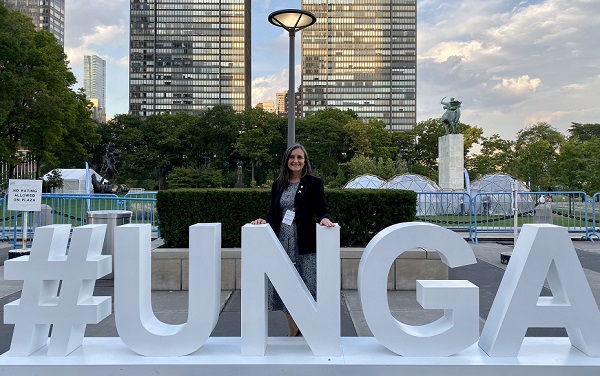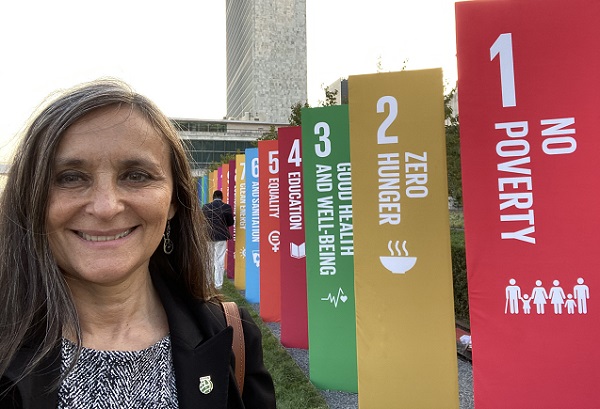The UN High Level Meeting on Universal Health Coverage
 Viviana Martinez-Bianchi, WONCA Executive Member-at Large and WHO Liaison person, was the WONCA Delegate to the UN High Level Meeting on Universal Health Coverage on September 23, 2019.
Viviana Martinez-Bianchi, WONCA Executive Member-at Large and WHO Liaison person, was the WONCA Delegate to the UN High Level Meeting on Universal Health Coverage on September 23, 2019.
On September 23, 2019 the world came together at the United Nations to the High-Level Meeting on Universal Health Coverage (UHC) where governments reaffirmed their commitment to health as a human right, and ensuring that everyone has access to essential and quality health services.
Considered historic, for being the first time for such discussion at the UN, member states recognised the critical need for strong health systems which provide primary health care services that are integrated, comprehensive, and people-centered; and address health promotion, prevention, treatment, and palliative care.
Representing WONCA, I called attention to the important role of the appropriately trained generalist family physician. Multiple comorbidities – acute, chronic, communicable and non- communicable diseases, poor mental health and addiction, injuries, accidents, violence and disability - increasingly affect people worldwide, and maternal and infant mortality continues to be a problem-, making the delivery of Primary Healthcare (PHC) quite complex. The diagnosis and majority of care for this complexity needs to be provided at the first level of care. Only a well prepared PHC workforce team with family doctors in their lead will be able to provide the comprehensive care people need. In addition, we need a PHC workforce ready to assess, treat and maintain health during large health emergencies, such as those caused by war, hurricanes, pandemics, and typhoons.
WONCA urged countries to increase the budget for PHC to meet population needs, and to aim for appropriate numbers of each graduating class of health professionals to work in the primary health care sector, to meet that need. In the US for example, Family Medicine organisations are working to increase to 25 % the numbers of doctors choosing Family Medicine for post graduate training; while in Kazakhstan the aim may be 60% of graduates of medical schools going into general practice. We called for investment in the training of skilled family doctors through the development of family medicine curricula in undergraduate and post graduate training and continuous professional development. Recruitment and retention policies that include appropriate salary support, work dignity and safety, and funding and logistic support for the training of all members of the primary health care workforce. We called for true commitment and multi-sectoral collaboration to achieve the goals of the declaration.
WONCA recognises that membership of primary care teams will differ from country to country, depending on their particular health demographics, geography, health needs and funding arrangements. But all members of the primary care team should be trained and qualified in delivering comprehensive community based, person-centred primary care.

As I navigated the United Nations High Level Meeting, participated and networked at multiple side events, I was truly happy to see that there is a new sense of the importance of primary health care; and that there needs to be a true commitment to a horizontal funding mechanism, instead of the typical silos of single interests in which most health care has been funded for decades.
The declaration
So, now we have a political declaration signed unanimously by all member countries of the UN. WONCA invites member organisations to review the declaration.
Declaration: UHC: moving together to build a healthier world".
I invite you to undertake the following exercise, review it and use the following suggested questions to facilitate discussion:
1.
Know the country or region’s baseline: What is the actual situation in
our country? What percent of GDP is used in healthcare what percent goes
to PHC? What would the ideal situation on the ground be? What is the
workforce? How many family doctors/ general practitioners in our
country/region versus what is needed? Percent with postgraduate
training? Training needs?
2. Multi sector engagement: How can our
organisation coordinate and contribute to this declaration? How do we
make sure that we coordinate our own actions together with government,
other members of civil society, health systems, other health
professions’ organisations, and other stakeholders so that we can use
the momentum generated at the UN?
3. Advocacy: What are our
priorities for advocacy? For example, are we training the number of
family doctors/ GPs to meet needs? If not what should we request from
government, ministry, health systems to meet the needs for training? And
how? Do an action plan.
4. Accountability: what are our own
measures of accountability as family doctor organisations? What measures
should we hold our governments accountable to?
5. What is missing in the declaration? What did we want more of that did not make it in there and should?
6. What should WONCA’s priorities for coordinated advocacy be?
|
*An analysis of the declaration will follow, once I do this exercise myself.
The declaration may not have everything we each wanted, and it may be imperfect, but a momentum exists that we need to build on. I look forward to your suggestions and comments. We have been given an amazing opportunity and should use it to improve health for all. In the words of our President Donald Li “WONCA is ready and willing to offer technical and policy support to any country that wants to incorporate qualified family doctors into the primary healthcare team. As a global organisation, WONCA is well-placed to support the achievement of the most important global health policy of our time”.